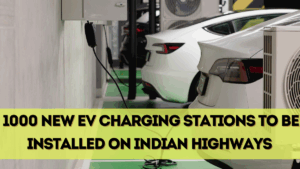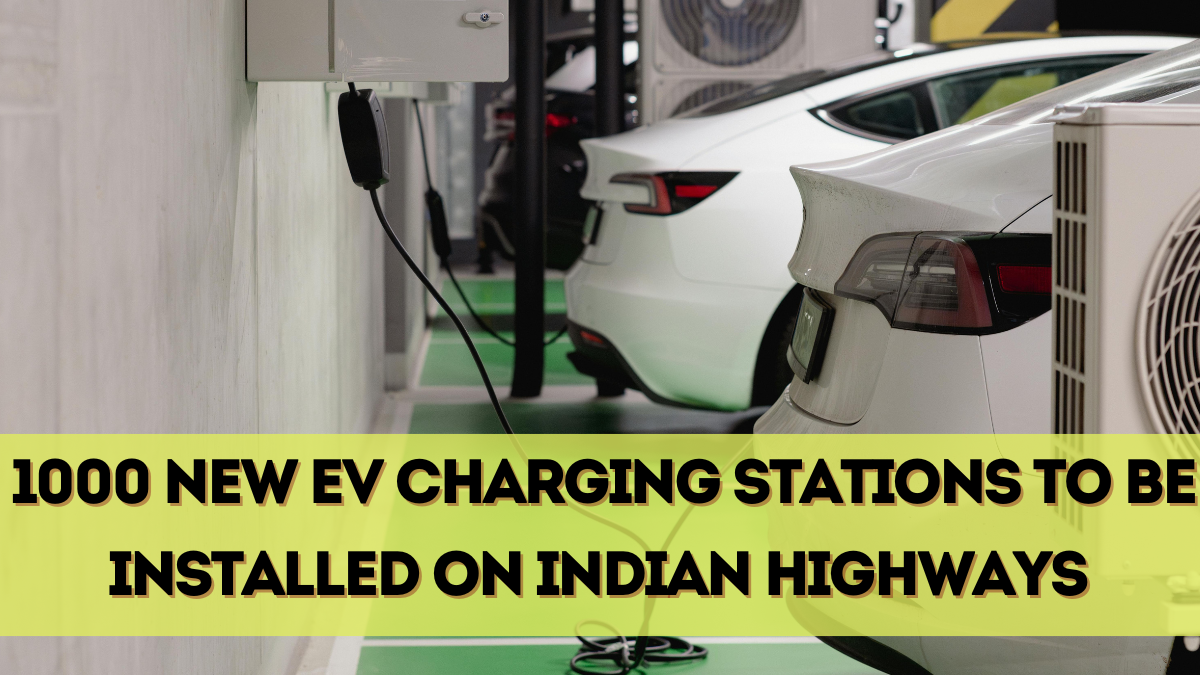India is taking a major step to support electric vehicle adoption with the announcement of 1000 new EV charging stations on highways. The project, led by the National Highways Authority of India (NHAI), will be completed by December 2025.
This expansion aims to make long-distance EV travel practical and stress-free, addressing one of the biggest barriers to EV adoption in the country.

Why Highway Charging Is Important
Urban charging networks are growing rapidly, but highways still lag behind. For many EV owners, the biggest concern is range anxiety during intercity travel.
By installing charging stations every few kilometers on major expressways, the government hopes to make cross-country travel in EVs a reality. This move is also expected to boost confidence among new buyers.
NHAI’s Role in the Expansion
The NHAI is collaborating with private firms, state governments, and energy companies to execute this project.
The plan includes:
-
1000 charging stations across national highways.
-
Locations at toll plazas, rest areas, and fuel stations.
-
Both fast chargers and slow AC chargers for flexibility.
-
Integration with UPI-based payment systems for easy transactions.
This structured rollout ensures that EV owners will have access to reliable infrastructure by the end of 2025.
Benefits for EV Owners
For EV drivers, this development brings multiple benefits.
-
Long-Distance Confidence: Owners can now plan trips without worrying about running out of charge.
-
Time Efficiency: Fast-charging points will allow 80% charge in under an hour.
-
Convenience: Charging stations will be placed at rest stops for combined food, fuel, and charging breaks.
-
Cost Savings: EV charging is still cheaper than refueling petrol or diesel cars.
These benefits are expected to encourage more people to make the switch from fossil-fuel vehicles.
Impact on EV Sales in India
EV adoption in India is growing, but buyers still hesitate due to limited charging infrastructure.
With 1000 highway charging stations coming up, analysts expect EV sales to rise further in 2025 and beyond. Compact EVs like Tata Nexon EV and MG ZS EV will particularly benefit, as highway charging will make them suitable for intercity commutes.
Car manufacturers also view this move as a positive push, giving them confidence to launch more affordable long-range EVs.
Green Mobility Push
The project supports India’s commitment to reducing carbon emissions and promoting green mobility.
Highway charging stations will directly contribute to the government’s target of achieving 30% EV adoption by 2030. They also align with the FAME-3 scheme, which provides incentives for EV adoption and infrastructure growth.
By offering nationwide connectivity, India is moving closer to a sustainable transport future.
Challenges in Execution
Despite the ambitious plan, challenges remain.
-
Power Supply: Ensuring uninterrupted electricity at remote highway locations will be tough.
-
Land Availability: Securing land at toll plazas and rest stops may delay installations.
-
Maintenance Issues: Charging stations must remain functional and well-maintained.
-
Cost Concerns: Setting up fast chargers requires high initial investment.
To overcome these challenges, NHAI is working with private energy firms to ensure smooth operation and shared costs.
Comparison with Global Efforts
Countries like the US and China already have thousands of charging stations across highways.
India’s plan to install 1000 stations by December 2025 may seem small in comparison, but it is a significant milestone considering the size and diversity of the country.
It also shows the government’s seriousness about making EVs practical for all categories of drivers, not just city users.
Future Outlook
Once the current 1000 stations are operational, NHAI plans to expand the network further. The long-term goal is to have charging stations every 50 km on all national highways.
By 2030, India could see 5,000+ highway charging stations, making EV travel as convenient as filling petrol or diesel.
This project could also encourage the rise of battery swapping hubs and solar-powered charging units, making the infrastructure even more sustainable.
FAQs
How many new EV charging stations are being installed on highways?
A total of 1000 new charging stations will be installed by December 2025.
Who is responsible for setting up the stations?
The NHAI, in partnership with private firms and energy providers, is executing the project.
Will these charging stations support fast charging?
Yes. Most stations will include DC fast chargers along with AC slow chargers for flexibility.
How will payments be made at these stations?
Payments will be integrated with UPI and QR codes, allowing easy cashless transactions.
What impact will this project have on EV adoption?
It will reduce range anxiety, encourage long-distance EV travel, and boost overall EV sales in India.
Click here to know more.
